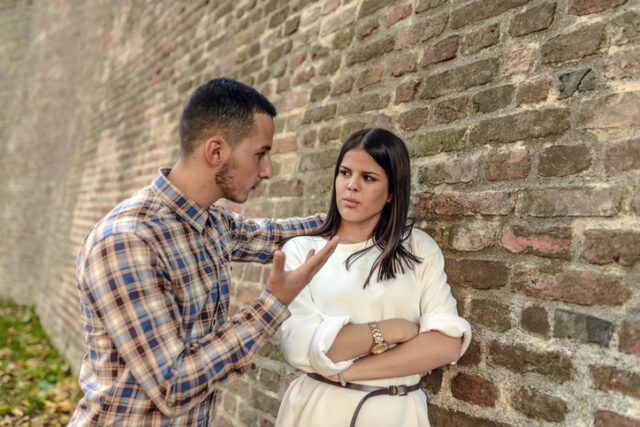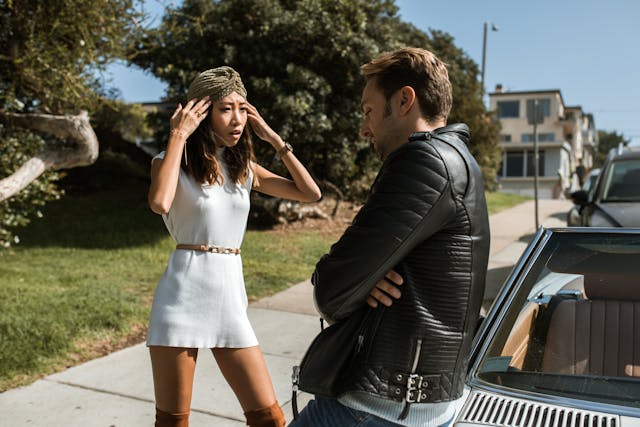Pretty much everyone knows what gaslighting is at this point.

It’s when someone says or does things to purposely make you feel crazy, or like your perceptions, memories, or judgement is somehow “off,” and it’s incredibly toxic. It tends to start subtly, meaning it’s much harder to recognise until it’s started to take its toll on your sense of stability and self-worth. However, if you’re starting to feel like it’s happening to you, here are some questions to ask yourself that should shed some light on what’s really happening. If your partner is indeed gaslighting you, don’t ignore it — things will only get worse from here.
1. Do I often feel confused about what’s real in our conversations?

Gaslighting often involves twisting facts or denying things that happened, leaving you questioning your memory. If you frequently feel unsure about what was said or done, it’s worth examining why this pattern is happening. Feeling this way regularly can create a sense of helplessness that’s hard to shake without clarity.
2. Do they dismiss my feelings or tell me I’m overreacting?

A classic gaslighting tactic is to minimise your emotions or label them as irrational. Ask yourself if your feelings are consistently invalidated or brushed aside, making you doubt their legitimacy. Being told you’re overreacting can destroy your ability to trust your own emotional responses.
3. Have they ever denied saying or doing something I clearly remember?

Gaslighters will often rewrite history, denying events or statements you recall vividly. If this happens a lot, it can knock your confidence in your own memory and judgement. Over time, this can lead to second-guessing even the simplest interactions.
4. Do I feel like I have to prove what happened?

Do you find yourself saving screenshots, keeping receipts, or mentally cataloguing events to defend your version of reality? If you feel the need to gather “evidence” in your relationship, it’s a red flag that something isn’t right. Feeling the pressure to constantly validate your experiences is emotionally draining.
5. Am I constantly apologising, even when I’ve done nothing wrong?

Gaslighting can make you feel like you’re always at fault. If you find yourself apologising excessively to keep the peace or avoid conflict, reflect on why this dynamic exists. Apologies in such situations can become automatic rather than meaningful.
6. Do they make me feel like I’m being too sensitive?

“You’re too sensitive” is a phrase often used to deflect accountability and make you doubt your reactions. Ask yourself if they consistently use this line when you express discomfort or hurt. It often pushes you into suppressing genuine feelings for the sake of harmony.
7. Do they turn my concerns back on me?

When you bring up an issue, does the conversation shift to your faults or flaws? This tactic, known as deflection, is designed to put you on the defensive and avoid addressing the real problem. Their redirection can leave you feeling like your concerns are never truly acknowledged.
8. Have I started doubting my ability to make decisions?

Gaslighting can chip away at your self-trust, leaving you second-guessing even small choices. If you’ve started relying on your partner to validate every decision, consider whether this dynamic feels healthy or balanced. Over time, this can create a cycle where independence feels out of reach.
9. Do I feel isolated from friends or family?

Gaslighters often try to cut you off from support systems, making you more dependent on them. If you feel like you’ve lost touch with loved ones, reflect on whether your partner has influenced this distance. Isolation makes it easier for manipulation to continue unchecked.
10. Do I feel like I’m walking on eggshells around them?

If you’re constantly tiptoeing around their moods, avoiding certain topics, or editing yourself to avoid conflict, it could be a sign of gaslighting or emotional manipulation. Living in such a heightened state of awareness can be mentally and emotionally exhausting.
11. Do I trust my gut feelings, or have I learned to ignore them?

Your intuition is a powerful guide, but gaslighting can train you to suppress it. If your gut tells you something is off, ask yourself why you might be ignoring that instinct. Ignoring these internal signals can lead to further disconnection from your sense of self.
12. Do they twist my words to make me seem unreasonable?

If they frequently misinterpret or exaggerate your statements to make you feel like the “bad guy,” it’s a sign they may be manipulating the narrative to control the situation. It can leave you hesitant to voice your thoughts, fearing they’ll be misconstrued again.
13. Do I feel drained or confused after our conversations?

Gaslighting conversations often leave you feeling emotionally exhausted or mentally foggy. If you consistently feel worse after talking through issues, take note of this pattern. It’s a sign the dynamic may be more harmful than constructive.
14. Do they make me question my perception of their behaviour?

If you’ve caught them in a lie or noticed inconsistent behaviour, do they brush it off or make you feel like you’re imagining things? Gaslighters often deflect accountability by casting doubt on your observations. This tactic creates an environment where truth feels elusive.
15. Have my self-esteem and confidence decreased since this relationship began?

One of the most harmful effects of gaslighting is its impact on your self-worth. If you’ve noticed a steady decline in how you see yourself, it’s worth exploring whether your relationship dynamic is contributing to this. Low self-esteem can make it even harder to recognise manipulation for what it is.
16. Do I feel safe expressing my thoughts and emotions?

Healthy relationships create a space for open communication, even during disagreements. If you feel fearful or hesitant to share your feelings, ask yourself what’s preventing that trust and openness. Feeling unsafe to express yourself is a signal that the relationship may lack the foundation of respect you deserve. Recognising gaslighting is the first step to addressing it.




